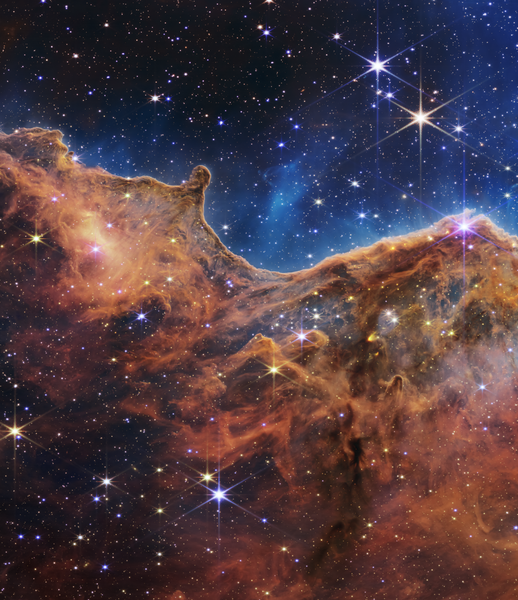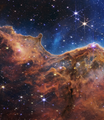File:Cosmic Cliffs in the Carina Nebula - left.png

Original file (7,288 × 8,441 pixels, file size: 58.93 MB, MIME type: image/png)
Captions
Captions
Summary[edit]
| Warning | The original file is very high-resolution. It might not load properly or could cause your browser to freeze when opened at full size. |
|---|
| DescriptionCosmic Cliffs in the Carina Nebula - left.png |
English: What looks much like craggy mountains on a moonlit evening is actually the edge of a nearby, young, star-forming region NGC 3324 in the Carina Nebula. Captured in infrared light by the Near-Infrared Camera (NIRCam) on NASA’s James Webb Space Telescope, this image reveals previously obscured areas of star birth.
Called the Cosmic Cliffs, the region is actually the edge of a gigantic, gaseous cavity within NGC 3324, roughly 7,600 light-years away. The cavernous area has been carved from the nebula by the intense ultraviolet radiation and stellar winds from extremely massive, hot, young stars located in the center of the bubble, above the area shown in this image. The high-energy radiation from these stars is sculpting the nebula’s wall by slowly eroding it away. NIRCam – with its crisp resolution and unparalleled sensitivity – unveils hundreds of previously hidden stars, and even numerous background galaxies. Several prominent features in this image are described below. -- The “steam” that appears to rise from the celestial “mountains” is actually hot, ionized gas and hot dust streaming away from the nebula due to intense, ultraviolet radiation. -- Dramatic pillars rise above the glowing wall of gas, resisting the blistering ultraviolet radiation from the young stars. -- Bubbles and cavities are being blown by the intense radiation and stellar winds of newborn stars. -- Protostellar jets and outflows, which appear in gold, shoot from dust-enshrouded, nascent stars. -- A “blow-out” erupts at the top-center of the ridge, spewing gas and dust into the interstellar medium. -- An unusual “arch” appears, looking like a bent-over cylinder. This period of very early star formation is difficult to capture because, for an individual star, it lasts only about 50,000 to 100,000 years – but Webb’s extreme sensitivity and exquisite spatial resolution have chronicled this rare event. Located roughly 7,600 light-years away, NGC 3324 was first catalogued by James Dunlop in 1826. Visible from the Southern Hemisphere, it is located at the northwest corner of the Carina Nebula (NGC 3372), which resides in the constellation Carina. The Carina Nebula is home to the Keyhole Nebula and the active, unstable supergiant star called Eta Carinae. NIRCam was built by a team at the University of Arizona and Lockheed Martin’s Advanced Technology Center. |
||||
| Date | |||||
| Source | https://stsci-opo.org/STScI-01G7ETPF7DVBJAC42JR5N6EQRH.png | ||||
| Author |
Image:
|
||||
| Other versions |
|
Licensing[edit]
| Public domainPublic domainfalsefalse |
| This file is in the public domain because it was created by NASA, ESA and CSA. NASA Webb material is copyright-free and may be freely used as in the public domain without fee, on the condition that only NASA, STScI, and/or ESA/CSA is credited as the source of the material. This license does not apply if source material from other organizations is in use. The material was created for NASA by Space Telescope Science Institute under Contract NAS5-03127. Copyright statement at webbtelescope.org. For material created by the European Space Agency on the esawebb.org site, use the {{ESA-Webb}} tag. |
 |
File history
Click on a date/time to view the file as it appeared at that time.
| Date/Time | Thumbnail | Dimensions | User | Comment | |
|---|---|---|---|---|---|
| current | 16:54, 12 July 2022 |  | 7,288 × 8,441 (58.93 MB) | W.carter (talk | contribs) | Uploaded a work by {{w|NASA}} from https://stsci-opo.org/STScI-01G7ETPF7DVBJAC42JR5N6EQRH.png with UploadWizard |
You cannot overwrite this file.
File usage on Commons
The following 5 pages use this file:
- File:Cosmic Cliffs in the Carina Nebula - left.png
- File:Cosmic Cliffs in the Carina Nebula - right.png
- File:NASA’s Webb Reveals Cosmic Cliffs, Glittering Landscape of Star Birth.jpg
- File:NASA’s Webb Reveals Cosmic Cliffs, Glittering Landscape of Star Birth.png
- File:NASA’s Webb Reveals Cosmic Cliffs, Glittering Landscape of Star Birth.tiff
File usage on other wikis
The following other wikis use this file:
- Usage on en.wikipedia.org
- Usage on no.wikipedia.org
Metadata
This file contains additional information such as Exif metadata which may have been added by the digital camera, scanner, or software program used to create or digitize it. If the file has been modified from its original state, some details such as the timestamp may not fully reflect those of the original file. The timestamp is only as accurate as the clock in the camera, and it may be completely wrong.
| Credit/Provider | NASA, ESA, CSA, STScI, Webb ERO Production Team |
|---|---|
| Source | STScI |
| Author | Space Telescope Science Institute Office of Public Outreach |
| Image title |
|
| Copyright holder |
|
| Short title |
|
| Usage terms | |
| Date and time of data generation | 11:00, 12 July 2022 |
| Width | 14,575 px |
| Height | 8,441 px |
| Pixel composition | RGB |
| Number of components | 3 |
| Horizontal resolution | 300 dpi |
| Vertical resolution | 300 dpi |
| Exif version | 2.31 |
| Color space | sRGB |
| Image width | 14,575 px |
| Image height | 8,441 px |
| Bits per component |
|
| Date and time of digitizing | 05:26, 6 December 2021 |
| Software used | Adobe Photoshop 23.3 (Macintosh) |
| Date metadata was last modified | 20:30, 12 July 2022 |
| File change date and time | 20:30, 12 July 2022 |
| Unique ID of original document | xmp.did:bd4625a5-242f-460c-85da-488cc38cad39 |
| Copyright status | Copyright status not set |
| Contact information | outreach@stsci.edu
3700 San Martin Drive Baltimore, MD, 21218 USA |
| Keywords |
|



